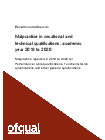Research: Malpractice in vocational and technical qualifications: academic year 2019 to 2020

Malpractice reported in 2019 to 2020 for Performance Table qualifications, Functional Skills qualifications and other general qualifications.
Documents
Malpractice in vocational and technical qualifications: academic year 2017 to 2018
Ref: Ofqual/21/6830HTML
Malpractice in vocational and technical qualifications: academic year 2019 to 2020
Ref: Ofqual/21/6830PDF, 465KB, 22 pages
This file may not be suitable for users of assistive technology.
Request an accessible format.
If you use assistive technology (such as a screen reader) and need aversion of this document in a more accessible format, please email [email protected].Please tell us what format you need. It will help us if you say what assistive technology you use.
Details
This report presents an analysis of penalties issued by awarding organisations for malpractice in higher stakes Vocational and Technical Qualifications (VTQs). This includes all VTQ Performance Table Qualifications (PTQs), Functional Skills Qualifications (FSQs) and Other General qualifications. The data covered in this report was collected from the relevant awarding organisations and focuses on the 2019 to 2020 academic year. Data was requested from 40 awarding organisations, covering 1,174 qualifications, although penalties were not reported for all of these. Comparisons between the 2019 to 2020 and previous academic years are not provided. This is because of the exceptional nature of assessments taken in summer 2020 due to the coronavirus (COVID-19) pandemic, which means that comparisons are not valid.
The analyses focus on the types of offences committed by, and the types of penalties issued to, students, centres, centre staff and examiners in England.
Main Findings
- A total of 1,381 penalties were reported for the academic year 2019 to 2020, for student, staff and centre offences. To give some context, there were just over 1 million certificates issued in 2019 to 2020 for the types of qualifications listed above, so the number of penalties is small.
- The highest number of these penalties were issued to students (78%), followed by centre staff (13%), and centres (9%). No penalties for examiners were reported.
- The majority of malpractice cases resulted in a single penalty.
- In 2019 to 2020, 973 penalties were issued for PTQs, 346 for FSQs, and 45 for Other General qualifications (and 17 for cases which were not specific to any qualification).
- In 2019 to 2020, the number of penalties was greater for external assessments (67%) compared to internal assessments (33%).
- The number of penalties was highest in paper-based exams (73%), followed by online exams (19%) and lastly, performance-based tasks (7%). The number of penalties for external assessments was highest in timetabled assessments (36%), followed by on-demand (non-sessional) assessments (27%) and on-demand (sessional) assessments (4%). The remaining 467 penalties (34% of penalties) were either internal assessments, or the assessment schedule was unknown.
- The most common type of malpractice for students in 2019 to 2020 was ‘plagiarism’ (35% of student penalties). The large proportion of malpractice in the form of ‘plagiarism’ likely reflects the high proportion of internal, coursework-based, assessments in VTQs.
- For centres and centre staff, ‘maladministration’ was the most common type of malpractice offence, responsible for 58% of centre malpractice and 38% of centre staff malpractice.
- The most common type of penalty issued to students was a ‘warning’ (41% of student penalties), followed by a ‘loss of marks’ (36% of student penalties).
- For centre staff, the most common types of penalties issued were ‘written warning’ and ‘training’ (both accounting for 40% of centre staff penalties).
- For centres, the most common types of penalties used were ‘withdrawal of approval for a specific qualification’ and ‘written warning’ (38% and 22% of centre penalties respectively).
Published 24 August 2021












Responses